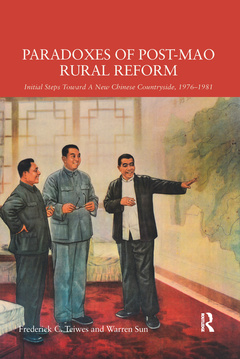Paradoxes of Post-Mao Rural Reform Initial Steps toward a New Chinese Countryside, 1976-1981
Auteurs : Teiwes Frederick C., Sun Warren

The decollectivization of Chinese agriculture in the early post-Mao period is widely recognized as a critical part of the overall reform program. But the political process leading to this outcome is poorly understood. A number of approaches have dominated the existing literature: 1) a power/policy struggle between Hua Guofeng?s alleged neo-Maoists and Deng Xiaoping?s reform coalition; 2) the power of the peasants; and 3) the leading role of provincial reformers. The first has no validity, while second and third must be viewed through more complex lenses.
This study provides a new interpretation challenging conventional wisdom. Its key finding is that a game changer emerged in spring 1980 at the time Deng replaced Hua as CCP leader, but the significant change in policy was not a product of any clash between these two leaders. Instead, Deng endorsed Zhao Ziyang?s policy initiative that shifted emphasis away from Hua?s pro-peasant policy of increased resources to the countryside, to a pro-state policy that reduced the rural burden on national coffers. To replace the financial resources, policy measures including household farming were implemented with considerable provincial variations. The major unexpected production increases in 1982 confirmed the arrival of decollectivization as the template on the ground. The dynamics of this policy change has never been adequately explained.
Paradoxes of Post-Mao Rural Reform offers a deep empirical study of critical developments involving politics from the highest levels in Beijing to China?s villages, and in the process challenges many broader accepted interpretations of the politics of reform. It is essential reading for students and scholars of contemporary Chinese political history.
Introduction 1. From the Dazhai Model to Hua Guofeng’s Pro-Peasant Policies, October 1976–Summer 1978 2. The Pre-Third Plenum Work Conference: Pro-Peasant Policies, Conflict, and the Ban on Household Contracting, November–December 1978 3. Household Responsibility Emerges as a Contentious Issue, 1978–1979 4. New Leadership And Uncertain Policy: Conflict in the National Context, 1980 5. The Gate to Decollectivization Decisively Opened Despite Uncertainty, 1981 6. Conclusion
Frederick C. Teiwes is Emeritus Professor of Chinese Politics at the University of Sydney, Australia.
Warren Sun is Reader in the Chinese Studies Program at Monash University, Australia.
Date de parution : 06-2020
15.6x23.4 cm
Date de parution : 12-2015
14.8x21 cm
Thèmes de Paradoxes of Post-Mao Rural Reform :
Mots-clés :
baochan; Baochan Daohu; daohu; Household Contracting; Du Runsheng; Dazhai Model; Wang Renzhong; Ji Dengkui; Chen Yonggui; Hu Yaobang; Farmland Capital Construction; Baogan Daohu; Sixty Articles; Dazhai Conference; Zhao Ziyang; Zhang Guangyou; Yu Guangyuan; Deng Liqun; Peasant Burdens; Brigade Accounting; Hu Qiaomu; Zhang Jingfu; Yao Yilin; Reduced Peasant Burdens; Party’s Rural Policies; Chen Yizi; Zeng Xisheng



